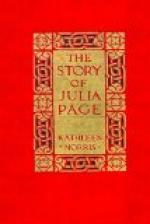But there was no severity in the glance she turned upon her daughter. Indeed, it would have been a stern heart that little Anna Studdiford’s first friendly glance did not melt. She had been exquisite from her babyhood, she was so lovely now, as she emerged from irresponsible infancy to thoughtful little girlhood, that Julia sometimes wondered how she could preserve so much charm and beauty unspoiled. Anna had her mother’s ash-gold hair, but where Julia’s rose firm and winglike from her forehead, and was held in place by its own smooth, thick braids, the little girl’s fell in rich, shining waves, sprayed in fine mist across her eyes, glittered, a golden mop in the sunlight, and even in the shade threw out an occasional gleam of gold. Anna’s eyes were blue, with curled thick lashes like her mother’s, but in the firm little mouth and the poise of her head, in the quick smile and quicker frown, Julia saw her father a hundred times a day. Her skin had the transparent porcelain beauty of babyhood, there was a suggestion of violet shadow about her eyes, and on her cheeks there glowed the warm colour of a ripe apricot. Even the gingham aprons and sturdy little shoes which she customarily wore did not disguise Anna’s beauty. Julia trusted more to the child’s wise little head than to the faint hope that her own precautions could ward off flattery and adulation. The two had been constant companions for more than four years: Anna’s little bed close to her mother’s at night, Anna’s bright head never out of Julia’s sight by day. If Anna showed any interest in what her mother was reading, Julia gave her a grave review of the story; if Julia went to market, Anna trotted beside her, deeply concerned as to cuts of meat and choices among vegetables; and when baking was afoot, Anna had a tiny moulding board on a chair, and cut cookies or scalloped tarts with the deep enjoyment of the born cook.
Once or twice the child had asked for her father, accepting quietly enough the explanation that he was in Germany, and very busy.
“Aren’t we going to see him some time, Mother?”
“Not while Grandma needs Mother so much, dear!” Julia would answer easily.
Easily, because the busy months with their pain and joy, their problems and their successes, had seemed to seal away in a deep crypt her memories of her husband. Julia had been afraid to think of him at first; she could not make herself think of him now; his image drifted vaguely away from her, as unreal as a dream. He was as much a name as if she had never seen him, never loved him, never suffered those exquisite agonies of grief and shame with which the first year of their separation was full. Jim’s child had taken his place; the purity and sweetness of the child’s love filled Julia’s heart; she wanted only Anna, and Anna was her interpreter for all the relationships of life. Anna first made her draw close to her own mother; Anna was at once her spur and her reward during the first hard years at Shotwell Street.




